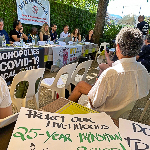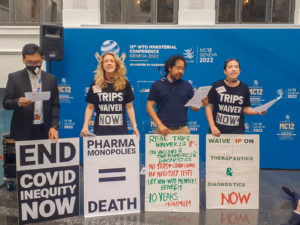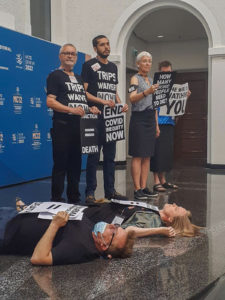WTO (Once Again) Prioritized Corporate Interests Over People’s Lives
[Reposted from PC News]
By Melanie Foley
In October 2020, India and South Africa, recognizing the unprecedented urgency of the fight against COVID-19, made a proposal at the World Trade Organization (WTO) to temporarily waive the patents and other WTO-enforced intellectual property barriers that limit global production of COVID vaccines, tests and treatments.
The Trump administration opposed this “TRIPS Waiver,” named in reference to the WTO Agreement on Trade-Related Aspects of Intellectual Property. After President Biden took office, an impressive coalition worked tirelessly to push the United States to support the commonsense proposal.
After a months-long campaign — sustained by dozens of health, faith, labor and consumer advocacy organizations, over 100 members of the U.S. Congress and millions of people around the world who took action — the Biden administration announced support for the waiver on May 5, 2021. This was a historic departure from decades of U.S. trade officials relentlessly attacking other countries’ access-to-affordable-medicines initiatives on behalf of Big Pharma.
But that announcement was not enough. Rich countries at the WTO, especially the European Union, United Kingdom, Switzerland and even the U.S., spent more than a year delaying negotiations and watering down the scope of the waiver.
Finally a decision was to be made at the June 2022 WTO Ministerial in Geneva, the biggest WTO meeting in years.
What Happened in Geneva
As Public Citizen’s representative at the WTO in Geneva, I witnessed the shocking process that resulted in “agreement” on a sham counterproposal to the waiver, a cynical, face-saving ploy that will not result in a single additional COVID shot.
As we have at past WTO Ministerials, Public Citizen worked in collaboration with partners in the Our World Is Not For Sale network, a group of organizations and activists committed to a socially just multilateral trading system. Various members from around the world represent fisherfolk, or subsistence farmers, or global union confederations. We focus on different issues, but work together so our collective voices can be amplified.
These civil society representatives, who had already jumped through hoops to be accredited to attend the WTO Ministerial, were informed with three day’s notice that they would not be permitted within WTO premises on the first day of the meeting.
 So on Day One, we quickly pulled together a press conference near the WTO, followed by a boisterous rally despite the 95-degree heat.
So on Day One, we quickly pulled together a press conference near the WTO, followed by a boisterous rally despite the 95-degree heat.
The WTO is uncommonly hostile to non-governmental organizations (NGOs). Where various United Nations bodies and other international government organizations permit NGOs to actively participate and comment on the record, the WTO makes any participation extremely difficult.
On Day Two, we could barely get into the building, and were certainly not allowed in negotiating rooms. WTO security initially told us that banners and signs were not permitted, or even t-shirts with printed slogans. (Geneva police at one point suggested the same, and very nearly arrested some of the coalition.)
 So in between meetings with delegations, we made our voices heard the only way we could. We held protests every day in the main atrium where negotiators mingled between meetings. Using the voice amplification tactic known as a “mic check,” we shared the concerns of the millions of people our organizations represent.
So in between meetings with delegations, we made our voices heard the only way we could. We held protests every day in the main atrium where negotiators mingled between meetings. Using the voice amplification tactic known as a “mic check,” we shared the concerns of the millions of people our organizations represent.
Going into the Ministerial, it was clear that, barring a miracle, there were only two possible outcomes for the waiver: no deal or a bad deal. Nonetheless, we worked to bolster the developing-country delegations that supported a real waiver and keep pressure on the rich-country delegations that opposed.
On Day Three of the Ministerial, we organized the first-ever “die-in” protest inside the WTO. We shouted in unison to onlooking negotiators the story of the rich countries watering down the waiver, as one by one activists coughed and collapsed to the floor. In between the flashing cameras of reporters, it was clear that several delegates were emotional watching the powerful demonstration.

Negotiators stayed through the night to try to hammer out a deal on the waiver. They convened in exclusive “Green Rooms,” where certain countries, often the majority of developing countries, are not permitted. Negotiations ended at 6:00AM and resumed at 9:00AM on the final day of the Ministerial, which had been extended. On that final day, negotiations continued all day and again into the night.
It is obvious that two days of no sleep is not the best way to make decisions that will impact quite literally the entire world. But this is even more problematic because rich governments are able to employ large negotiating teams, who can take turns to rest and recharge. Developing country governments may not have that luxury, and may not be able to pay to move a flight or stay an extra night in an expensive Geneva hotel for an extended Ministerial. But at the WTO, if you are absent from the final agreement on a package, you are considered to have consented.
A Terrible Deal Is Agreed
In the end, WTO members agreed to a text that fails to address intellectual property barriers to producing COVID-19 vaccines. It excludes dozens of countries. It delays for six months any discussion of a waiver for COVID-19 tests and treatments. This deal sets a negative predent for future pandemics and helps no one but Big Pharma.
Even worse, this deal was only secured by trading away other proposals demanded by people in the Global South, for example the right to build food reserves in case of emergency. The final agreement at the end of the Ministerial was total capitulation to rich countries’ corporate interests at the expense of development, access to medicines, agriculture, and fair, sustainable fish harvest.
WTO leadership and many governments (including the U.S.) have chosen to ignore reality and celebrate this terrible deal as if it proves the failing WTO to be relevant.
But public health and civil society experts were not fooled. They are united in condemnation of this counterproposal to a real TRIPS waiver.
Three hundred groups are now calling on governments to take unilateral action to address intellectual property barriers, since the WTO has proven itself incapable of getting its own rules out of the way.
So Now What?
I won’t sugarcoat it. It’s a hard loss. And it’s hard to accept that this is how the world works, or at least the World Trade Organization.
We went up against one of the most powerful interests in the world: Big Pharma. And to paraphrase the wonderfully sappy 1990s political romance, The American President: “You don’t fight the fights you can win. You fight the fights that are worth fighting.”
But it’s not just about fighting the good fight. This campaign produced important results that we must build upon to keep the pressure on the U.S. government to prioritize access to COVID medicines over Pharma profits.
- Biden’s May 5 announcement in support of a waiver was truly historic, something many advocates who work in this area thought was impossible.
- As limited as the non-waiver agreement is, it does cement within the WTO the idea that intellectual property can be a barrier to access. These aren’t inalienable rights handed down from God. They are rules that people made, and they can be changed.
- This is the most attention on the WTO and its failings since the infamous Seattle protests in 1999. Now that millions of people have been made aware of the WTO’s unacceptable medicines rules, it will be that much easier to address other WTO concerns, like the ongoing negotiations for Big Tech-friendly digital trade terms.
It has been an honor to work with Public Citizen activists, our domestic colleagues, and our tireless international allies who led the waiver campaign from the start. The fight continues.